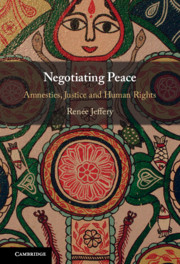5 - Nepal
From Tacit Acceptance to Noncompliance
Published online by Cambridge University Press: 04 March 2021
Summary
This chapter examines the peace process undertaken by the Government of Nepal and the Community Party of Nepal-Maoist (CPN-M). Nepal’s Comprehensive Peace Agreement (CPA), negotiated in the presence of United Nations officials and signed in 2006, does not include an amnesty provision but a commitment to accountability for human rights violations and an agreement to end impunity for such crimes. Yet, as this chapter demonstrates, agreement to include anti-impunity measures in the CPA was driven, not by a commitment to end impunity for human rights violations, but by a desire to avoid criticism from the international actors present during the negotiations. This lack of intention to comply with the human rights terms of the CPA was evident in the negotiating process and has been born out in the post-conflict period, with several successive governments attempting to legislate in favour of introducing amnesty laws. At the same time, a lack of capacity within those local institutions committed to ending impunity for human rights violations, exacerbated by the withdrawal of UN support for their processes, has hampered efforts to combat these impunity measures.
- Type
- Chapter
- Information
- Negotiating PeaceAmnesties, Justice and Human Rights, pp. 149 - 173Publisher: Cambridge University PressPrint publication year: 2021

